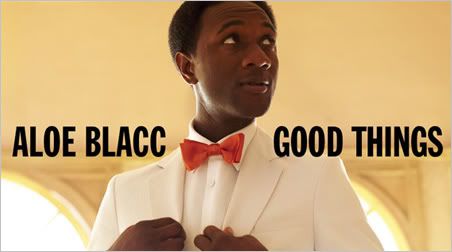
“I Need a Dollar”
from the album Good Things
2010
iTunes
Aloe Blacc is a changed man. Or, at least, a man who’s grown up. Good Things is a marked leap upward in quality and maturity, a showcase for a singer who’s filled into his voice and potential. This sophomore effort bids adieu to the greenhorn of his first proper outing, Shine Through, a neophyte who seemingly tried out every available style to see what fitted best. In his place, Good Things welcomes the arrival of a dueño declaring what’s his.
The confidence of Good Things may be its most distinguishing feature. Blacc owns each of the 13 songs on the album. That’s true even for his version of The Velvet Underground’s “Femme Fatale,” a slower and more soulful take that, in its brassy arrangement and earnest, plaintive delivery, is less a cover than a full-scale reinterpretation. Listeners may disagree with Blacc’s substitution of wistfulness and sweeping drama for the original’s sly understatement, or simply find the whole endeavor galling. But no one can deny the boldness of the attempt, the audacity to stake a claim to something that so clearly belongs to others.
In a write-up of Shine Through, this reviewer took Blacc to task for lacking the character, charisma, or depth that distinguishes the best soul singers from the chorus of pretty voices. That review, in hindsight, was put too strongly and needlessly harsh and overwritten. But its central point — that Blacc was too content to coast on his raw singing ability rather than fully think through his material — still seems correct revisiting Shine Through today. Consider Good Things a rejoinder, if not a knockout counterpunch.
On this album, Blacc roots himself in the retro sounds of the 1970s. It’s a predictable move in these times of chic revivalism but, nonetheless, it proves to be more than a cynical effort to stay downwind of the gales of popular taste. Blacc’s baritone fits the organic instrumentation and romanticism of soul much better than the programmed burlesque of hip hop, the genre that grounded – in both senses of the word – his earlier work. Old-fashioned soul music gives Blacc more flexibility to show off his range, from the full-throated sing-song of “Miss Fortune,” to the falsetto cry on the backup chimes of “Your Love is Killing Me.”
Soul is also more consistent with Blacc’s content. Good Things is a record defined by wariness, a catalogue of suspicions and grievances about the economy, poverty and, of course, women. Despite his mere 30 years on this earth, Blacc sings with the timbre of an older man, a figure who may not be smarter than you but who, having taken lump after lump, knows more and speaks authoritatively — even a tad self-righteously — from that platform of experience. Throughout, Blacc assesses all around him from a wealth of perspectives that borders on near-omniscience: he identifies the courtesan in “Hey Brother,” decries, institution by institution, the unjustness of the recession in “Life So Hard,” and takes the long view on “Good Things,” describing his better life following his ex-lover’s exit. At his weakest moments, Blacc can be pedant who seemingly recorded Good Things from the reclined seat of a grandpa’s armchair. On the whole, though, Blacc sinks much more comfortably into the dated sound of soul than the youthful energies of hip hop.
Which isn’t to say, however, that Good Things is supine or aged to the point of staleness. The first song puts those concerns to rest quickly enough. “I Need a Dollar,” the theme to HBO’s How to Make It in America, is a stirring narrative about one man’s navigation of our stagnant labor market, a voyage that leads him from regular employment to meekly offering his story in exchange for a single greenback. Now, that kind of down-and-out tale may not seem “stirring” to most. But Blacc sings with such pizzazz, interject a “hey-hey” between lines as if enjoying himself too much to take a breather, he belies — almost — the sad state of affairs at hand. Blacc’s character is, if nothing else, a hustler gamely making a buck out of nothing, an entrepreneur who’s translated the circumstance of not having a job into a story you’d pay to hear. Of course, we’re only talking about the self-contained world of a pop number; if the dole were really this compelling, we wouldn’t have George Washington impersonators marching on Washington. But, still, what a world Blacc presents: a place where our trials aren’t minimized, where there yet remains a faint ring of hope, if not in the narrator’s actual words then at least in the pluck with which he recites them. Maybe to those familiar with the show, “I Need a Dollar” won’t seem so invigorating. Others, however, will find the song’s calibrated optimism, frank and dim but alight all the same, not only refreshing but right.
For those, like me, who previously dismissed Aloe Blacc, Good Things warrants our reconsideration. Blacc’s changed his tune. We probably should, too.


